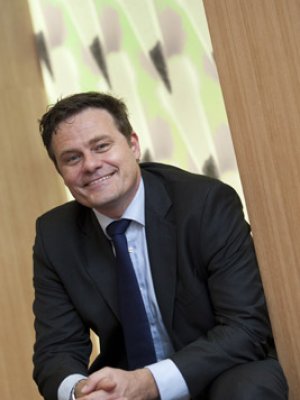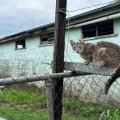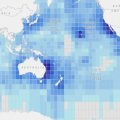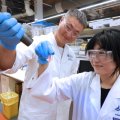
Brisbane biomedical engineer Professor Mark Kendall is one of only five international recipients of a prestigious Rolex Laureate, recognising his pioneering efforts to expand knowledge and improve human life.
A researcher at the Australian Institute for Bioengineering and Nanotechnology at The University of Queensland, Professor Kendall is the driving force behind development of needle-free vaccine delivery device the Nanopatch. He was selected from a field of more than 3,500 applicants.
Professor Kendall received the accolade and $100,000 in prize-money at a gala 2012 Rolex Awards for Enterprise ceremony in London on June 13.
He said the accolade was an honour and encouragement for people to tackle the “big problems” that often do not come neatly packaged within a strand of science or formal training.
Professor Kendall welcomed recognition of the innovation that underlines development of the Nanopatch along the pipeline towards becoming a product that can improve the performance and reach of vaccines to people worldwide.
His research aims to replace the traditional needle and syringe with a patch smaller than a postage stamp to deliver vaccines painlessly and more efficiently.
The Nanopatch has thousands of small projections designed to deliver the vaccine to abundant immune cells in the skin, whereas the traditional syringe delivers to the muscle, where there are few immune cells.
Professor Kendall co-founded Vaxxas in late 2011 with a $15 million investment from Australian and US investors to advance the Nanopatch towards clinical testing and product development.
It is intended that the award will be matched dollar for dollar by The University of Queensland and used for a project to further develop the Nanopatch to ultimately improve access to vaccines in low-resource regions, including a usability trial in Papua New Guinea.
The project will be led by Professor Kendall in collaboration with Darin Zehrung and his technical colleagues at the Vaccine Technologies group of PATH in Seattle, Professor Glen Mola at the Papua New Guinea Medical Research Institute, Professor Robert Booy at the National Centre for Immunisation Research and Surveillance, and epidemiologist Dr Julia Brotherton at the Victorian Cytology Service.
The Rolex Awards are bestowed biennially and aim to foster a spirit of enterprise around the world. There were only 115 awarded between 1978 and 2011.
Recipients are recognised for work in areas of science and medicine, technology and innovation, exploration and discovery, the environment or cultural heritage.
The Laureates were announced at the British Academy, at a function together with members of the international jury of 12 eminent scientists, explorers, environmentalists and other experts who chose them.
This will be followed by a gala event celebrating the work of the new Laureates to be held in India in November.
Media: In Australia: Erik de Wit (+61 427 281 466, 3346 3962 or e.dewit@uq.edu.au). In London (timezone): Prof Mark Kendall (+61 431 162 391); For Kendall research group in Australia: Anne Kollorz Ewing (+61 7 3346 4265 or a.ewing@uq.edu.au).
.jpg)









